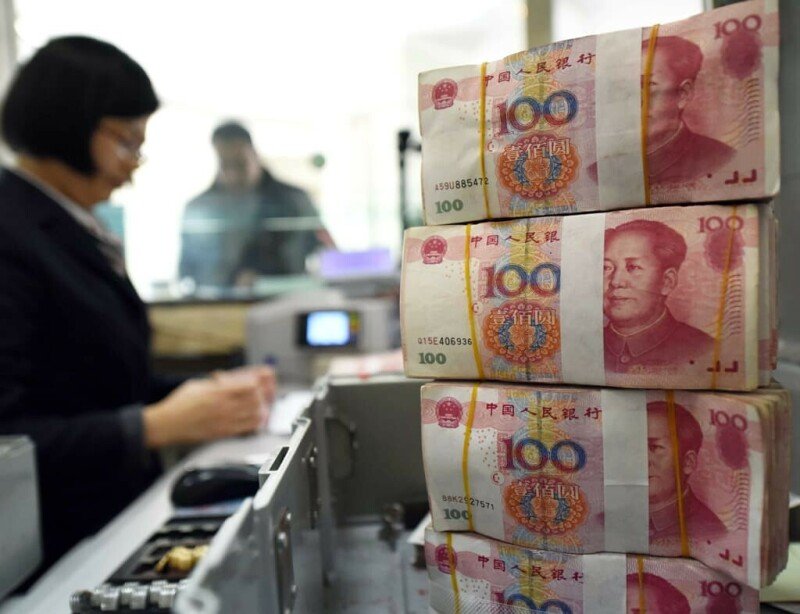
In the face of a persistent dollar crisis, Bangladesh is looking to fortify its economic ties with China by leveraging the yuan for bilateral trade. Despite having the regulatory framework in place since September 2022, Bangladeshi businesses have yet to capitalize on this opportunity.
Bangladeshi Prime Minister Sheikh Hasina’s ongoing visit to China is aimed at expediting this initiative, which is pivotal to stabilizing Bangladesh’s economy.
China is a significant trading partner of Bangladesh, accounting for 25 percent of its total imports, but the problem of the trade imbalance should be addressed.
The post-COVID-19 economic landscape has exacerbated Bangladesh’s financial challenges, with declining reserves, a 10 percent drop in garment exports, and soaring inflation. Despite a $4.7 billion loan from the International Monetary Fund last year, Bangladesh’s export sector continues to struggle. The country’s financial strain was underscored when Fitch Ratings downgraded Bangladesh’s credit score in May due to dwindling reserves.
In a bid to mitigate the foreign exchange reserve crisis, Bangladesh has sought a loan of 36.5 billion yuan ($5 billion) from China. Abdur Rouf Talukder, governor of Bangladesh Bank, the country’s central bank, said that this loan, to be taken in yuan, is aimed at alleviate the foreign exchange shortage and cover import costs. The favorable low interest rate, thanks to the Shanghai Interbank Offered Rate, makes this loan more attractive compared than US dollar-denominated loans.
Bangladeshi State Minister for Commerce Ahasanul Islam Titu has proposed using local currencies — the Bangladeshi taka and the Chinese yuan — alongside the US dollar for bilateral trade. This approach could help alleviate the ongoing dollar shortage and expand regional trade.
Unlike the Indian rupee, the Chinese yuan is one of the five high-value currencies recognized by the IMF, making transactions in yuan both feasible and internationally accepted. China’s Ambassador to Bangladesh Yao Wen emphasized this point while addressing the media after meeting with Bangladeshi Planning Minister Abdus Salam at the Planning Commission office.
He said that the fluctuation of the dollar rate is now a worldwide problem, which China is also facing, and that China wishes to work with Bangladesh. He highlighted that engaging with Bangladesh in using their currencies — the yuan and the taka — for trade could be a viable alternative to using the highly fluctuating US dollar. In addition to trade, China seeks to collaborate with Bangladesh in other development activities.
Salam echoed this sentiment, acknowledging China’s significant role in supporting Bangladesh’s five-year plans, and assured that any delays in the disbursement of the promised funds from China would be resolved through discussions.
To foster yuan-denominated trade between Bangladesh and China, several measures need to be implemented:
First, it is necessary to strengthen the banking infrastructure to facilitate the yuan’s transactions, and bank officials must be trained to handle yuan-denominated letters of credit and transactions.
Second, conducting awareness and training programs to educate businesses on the benefits and procedures of trading in the yuan can encourage them to switch to yuan-denominated trade and other exchanges.
Third, offering incentives such as reduced transaction fees or favorable exchange rates for yuan-denominated trade can encourage businesses to shift from dollar- to yuan-transactions.
Fourth, strengthening bilateral agreements to ensure smooth and secure yuan-denominated transactions will foster trust and confidence among businesses.
And fifth, establishing a robust monitoring and evaluation system to track the progress of yuan-denominated trade and address any challenges promptly is vital.
By implementing these measures, Bangladesh can effectively use the yuan for trade, reducing its dependency on the US dollar and strengthening its economic relationship with China. With Sheikh Hasina visiting China, there is renewed optimism that these strategic initiatives will pave the way for a more balanced and resilient bilateral trade framework. The move not only aims to stabilize Bangladesh’s economy but also to enhance the economic interdependence between the two countries, fostering a more sustainable and mutually beneficial partnership.
The author is general secretary of the China Bangladesh Friendship Center Limited and president of Asian Club Limited. The views don’t necessarily reflect those of China Daily.
If you have a specific expertise, or would like to share your thought about our stories, then send us your writings at opinion@chinadaily.com.cn, and comment@chinadaily.com.cn.







